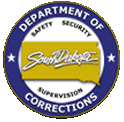Frequent Questions
Juvenile Visitation
Am I allowed to visit my child after they are committed to the Department of Corrections?
Yes. The Department of Corrections encourages appropriate contact between family members and juveniles in our care. Contact may be restricted if such contact would jeopardize the security, safety or the disciplined operation of an institution. Visitation shall not interfere with school, counseling, medical services or other treatment programs that the juvenile is participating in.
Who can visit a juvenile in a DOC facility?
Immediate family members such as parents, step-parents, adoptive parents, siblings, step-siblings, grandparents, spouse, children of the juvenile or any other juvenile that is approved by the Chief Executive Officer (CEO) of the institution as someone that may be beneficial to the juvenile's treatment.
All visitors are subject to a background check and are required to provide a social security number and date of birth for the check to be completed. Failure to provide this information will result in the denial of visitation privileges until such a time the information is provided.
If someone has outstanding warrants, is on parole, probation, juvenile aftercare or has been convicted of a felony offense, visitation may be denied.
Attorneys and clergy will be allowed to visit, pursuant to policy, after presenting proper credentials and identification.
How can I schedule a visit?
Call the youth's Juvenile Corrections Agent (JCA) or the program they are assigned to at least 48 hours in advance of the visit.
If family is unable to attend during regularly scheduled visit times, the CEO of the institution or their designee may authorize special arrangements for a visit.
When are visit times?
Visit times vary by program. Check with the program or the JCA for information.
What are the visitation rules?
The rules of visitation include, but are not limited to:
Visitors are required to provide a photo ID or a birth certificate prior to entering the facility.
Contraband is a very serious issue in a correctional setting. Visitors are subject to a hand pat search and search of their personal belongings by staff at any time prior, during or immediately following the visit. Refusal to be searched will be sufficient cause for denial or termination of a visit. Possession of tobacco, alcohol, controlled substances, firearms, and other items considered to be weapons or other prohibited items is not allowed.
Any visitor found to be in possession of a controlled substance or contraband as defined by South Dakota codified law will be detained and law enforcement will be notified.
Any visitor under the influence of alcoholic beverages, marijuana, controlled substances or other chemicals may be denied visitation.
In order to facilitate visitation for as many juveniles as possible, limitations may be set on the number of people visiting and on the length of visits.
Are off-campus visits allowed?
Yes, in certain circumstances. The facility CEO or their designee can approve and establish guidelines for off-campus visits for juveniles that have achieved a Low classification status.
What if the child is housed in a non-DOC facility/program?
They are subject to the visitation rules of that facility/program.

